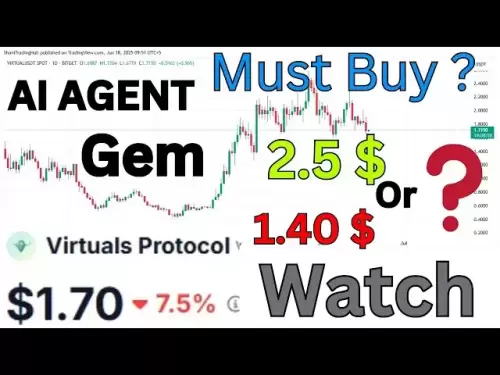-
 Bitcoin
Bitcoin $106,754.6083
1.33% -
 Ethereum
Ethereum $2,625.8249
3.80% -
 Tether USDt
Tether USDt $1.0001
-0.03% -
 XRP
XRP $2.1891
1.67% -
 BNB
BNB $654.5220
0.66% -
 Solana
Solana $156.9428
7.28% -
 USDC
USDC $0.9998
0.00% -
 Dogecoin
Dogecoin $0.1780
1.14% -
 TRON
TRON $0.2706
-0.16% -
 Cardano
Cardano $0.6470
2.77% -
 Hyperliquid
Hyperliquid $44.6467
10.24% -
 Sui
Sui $3.1128
3.86% -
 Bitcoin Cash
Bitcoin Cash $455.7646
3.00% -
 Chainlink
Chainlink $13.6858
4.08% -
 UNUS SED LEO
UNUS SED LEO $9.2682
0.21% -
 Avalanche
Avalanche $19.7433
3.79% -
 Stellar
Stellar $0.2616
1.64% -
 Toncoin
Toncoin $3.0222
2.19% -
 Shiba Inu
Shiba Inu $0.0...01220
1.49% -
 Hedera
Hedera $0.1580
2.75% -
 Litecoin
Litecoin $87.4964
2.29% -
 Polkadot
Polkadot $3.8958
3.05% -
 Ethena USDe
Ethena USDe $1.0000
-0.04% -
 Monero
Monero $317.2263
0.26% -
 Bitget Token
Bitget Token $4.5985
1.68% -
 Dai
Dai $0.9999
0.00% -
 Pepe
Pepe $0.0...01140
2.44% -
 Uniswap
Uniswap $7.6065
5.29% -
 Pi
Pi $0.6042
-2.00% -
 Aave
Aave $289.6343
6.02%
Is Bitcoin ETF suitable for beginners? Is it difficult to get started?
Bitcoin ETFs offer a simpler way for beginners to invest in crypto, but be aware of fees and market volatility. Start small and educate yourself before investing.
May 16, 2025 at 10:49 am

Is Bitcoin ETF suitable for beginners? Is it difficult to get started?
Investing in financial instruments can be daunting, especially for beginners. Among the myriad of options available, Bitcoin Exchange Traded Funds (ETFs) have emerged as a popular choice for those looking to gain exposure to the cryptocurrency market without directly owning the underlying asset. But is a Bitcoin ETF suitable for beginners, and how difficult is it to get started? Let's delve into these questions and provide a comprehensive overview.
Understanding Bitcoin ETFs
A Bitcoin ETF is a type of investment fund and exchange-traded product that tracks the price of Bitcoin. Unlike owning Bitcoin directly, an ETF allows investors to buy shares in a fund that holds Bitcoin or Bitcoin futures contracts. This provides a more regulated and often more accessible way to invest in the cryptocurrency market.
For beginners, the primary advantage of a Bitcoin ETF is the familiarity with traditional investment vehicles. If you are already comfortable trading stocks or other ETFs, then a Bitcoin ETF can be a seamless addition to your portfolio. It eliminates the need to navigate cryptocurrency exchanges, manage digital wallets, and handle the complexities of securing your own Bitcoin.
Advantages for Beginners
One of the key benefits of a Bitcoin ETF for beginners is reduced complexity. When you invest in a Bitcoin ETF, you do not need to worry about the technical aspects of cryptocurrency trading. You can buy and sell shares of the ETF through a standard brokerage account, just as you would with any other stock or ETF.
Another advantage is increased regulatory oversight. Bitcoin ETFs are subject to the regulations of financial authorities, which can provide a layer of security and transparency that may be lacking in direct cryptocurrency investments. This can be particularly appealing to beginners who are wary of the risks associated with the unregulated nature of many cryptocurrency exchanges.
Diversification is also an important consideration. By investing in a Bitcoin ETF, you can gain exposure to Bitcoin without putting all your funds into a single asset. This can help mitigate risk and is a strategy often recommended for beginners.
Potential Challenges for Beginners
While Bitcoin ETFs offer many advantages, there are also potential challenges that beginners should be aware of. One of the primary concerns is fees. Bitcoin ETFs often come with management fees and other expenses that can eat into your returns. It's important to carefully review the fee structure of any ETF you are considering to ensure it aligns with your investment goals.
Another challenge is market volatility. Bitcoin is known for its significant price swings, and while an ETF can provide a more stable investment vehicle, it is still subject to the same market forces that affect the price of Bitcoin. Beginners should be prepared for potential fluctuations in the value of their investment.
Finally, limited control over the underlying asset is a consideration. When you invest in a Bitcoin ETF, you do not have direct ownership of Bitcoin. This means you cannot use the Bitcoin for transactions or move it to a personal wallet. For some beginners, this may be a drawback if they are interested in the practical applications of cryptocurrency.
How to Get Started with a Bitcoin ETF
Getting started with a Bitcoin ETF is relatively straightforward, but there are a few steps you should follow to ensure a smooth investment process:
Choose a Brokerage: First, you need to select a brokerage that offers access to Bitcoin ETFs. Many major brokerages now offer a range of cryptocurrency-related products, so you should have no trouble finding one that meets your needs.
Open an Account: If you don't already have an account with the chosen brokerage, you will need to open one. This typically involves providing personal information, verifying your identity, and funding your account.
Research Bitcoin ETFs: Before investing, take the time to research the available Bitcoin ETFs. Look at factors such as the fund's performance history, fees, and the underlying assets it holds. Some popular Bitcoin ETFs include the ProShares Bitcoin Strategy ETF (BITO) and the Valkyrie Bitcoin Strategy ETF (BTF).
Place Your Order: Once you have chosen a Bitcoin ETF, you can place an order through your brokerage account. You can typically buy shares in the same way you would buy any other stock or ETF, either through a market order or a limit order.
Monitor Your Investment: After purchasing shares in a Bitcoin ETF, it's important to monitor your investment regularly. Keep an eye on the fund's performance and any news or developments that could impact the price of Bitcoin.
Considerations for Beginners
For beginners, it's crucial to start small. Investing in a Bitcoin ETF can be a good way to dip your toes into the cryptocurrency market without risking a significant amount of capital. Consider starting with a small investment and gradually increasing your exposure as you become more comfortable with the market.
Education is also key. Before investing in a Bitcoin ETF, take the time to educate yourself about Bitcoin, the broader cryptocurrency market, and the specifics of the ETF you are considering. There are numerous resources available online, including articles, videos, and forums, that can help you build your knowledge.
Finally, consult with a financial advisor. If you are new to investing or unsure about the best way to approach a Bitcoin ETF, speaking with a financial advisor can provide valuable guidance. They can help you assess your risk tolerance, set investment goals, and develop a strategy that aligns with your financial situation.
Frequently Asked Questions
Q: Can I lose all my money investing in a Bitcoin ETF?
A: Yes, it is possible to lose money investing in a Bitcoin ETF, just as with any other investment. Bitcoin is a highly volatile asset, and the value of a Bitcoin ETF can fluctuate significantly. It's important to invest only what you can afford to lose and to diversify your portfolio to mitigate risk.
Q: Are there tax implications to consider when investing in a Bitcoin ETF?
A: Yes, there can be tax implications when investing in a Bitcoin ETF. Depending on your jurisdiction, you may be subject to capital gains tax on any profits you make from selling your ETF shares. It's advisable to consult with a tax professional to understand the specific implications for your situation.
Q: Can I convert my Bitcoin ETF shares into actual Bitcoin?
A: No, you cannot directly convert your Bitcoin ETF shares into actual Bitcoin. A Bitcoin ETF is a financial product that tracks the price of Bitcoin but does not give you ownership of the underlying asset. If you want to own Bitcoin directly, you would need to purchase it through a cryptocurrency exchange.
Q: How does the performance of a Bitcoin ETF compare to owning Bitcoin directly?
A: The performance of a Bitcoin ETF can closely track the price of Bitcoin, but there may be differences due to factors such as fees and the specific structure of the ETF. Over time, the returns of a Bitcoin ETF may be slightly lower than owning Bitcoin directly due to management fees and other expenses. However, the convenience and regulatory oversight of an ETF can make it a more suitable choice for some investors.
Disclaimer:info@kdj.com
The information provided is not trading advice. kdj.com does not assume any responsibility for any investments made based on the information provided in this article. Cryptocurrencies are highly volatile and it is highly recommended that you invest with caution after thorough research!
If you believe that the content used on this website infringes your copyright, please contact us immediately (info@kdj.com) and we will delete it promptly.
- Riding the Solana Wave: Spot ETFs and Investment Opportunities
- 2025-06-18 22:45:12
- Hedera (HBAR) and 2030 Wealth: A Realistic Outlook
- 2025-06-18 23:05:12
- XRP Lawsuit: Settlement Hopes Rise with Bill Morgan's Insights
- 2025-06-18 23:22:17
- Solaxy Presale: Is This Crypto Explosion the Next Big Thing on Solana?
- 2025-06-18 22:25:13
- Alchemy Pay, Ripple, and RLUSD: A New Era for Crypto Payments?
- 2025-06-18 22:45:12
- QBI Token, AI Fintech, and Cloud Deployment: A New Era in Finance
- 2025-06-18 23:24:19
Related knowledge
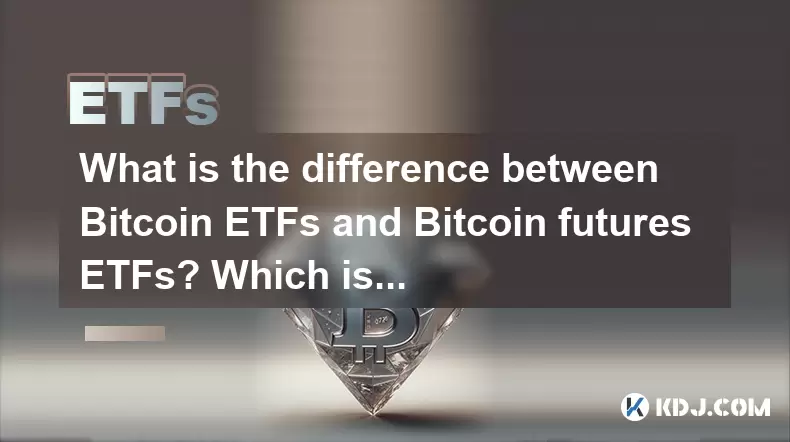
What is the difference between Bitcoin ETFs and Bitcoin futures ETFs? Which is more suitable for retail investors?
Jun 12,2025 at 09:57pm
Understanding Bitcoin ETFs and Their PurposeA Bitcoin ETF (Exchange-Traded Fund) is a financial product that allows investors to gain exposure to Bitcoin without directly purchasing or holding the cryptocurrency. These ETFs are traded on traditional stock exchanges, making them accessible to retail investors who may not be familiar with crypto wallets o...
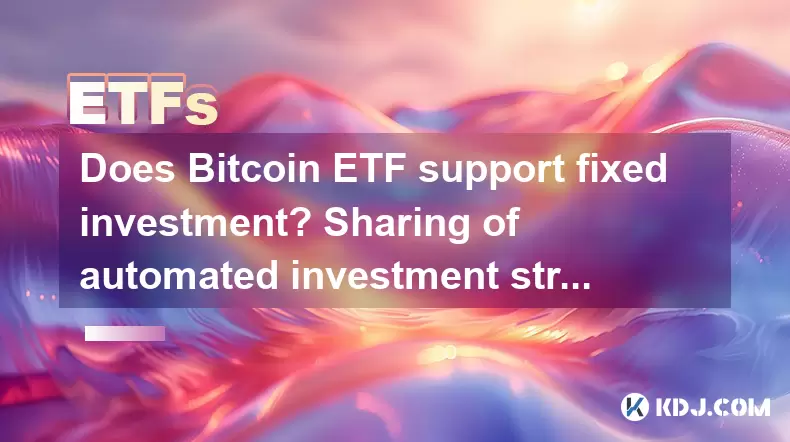
Does Bitcoin ETF support fixed investment? Sharing of automated investment strategies
Jun 10,2025 at 06:01pm
What is a Bitcoin ETF?A Bitcoin ETF (Exchange-Traded Fund) is an investment vehicle that tracks the price of Bitcoin and is traded on traditional stock exchanges. Unlike directly purchasing Bitcoin, investing in a Bitcoin ETF allows investors to gain exposure to Bitcoin without dealing with wallets, private keys, or blockchain transactions. The ETF hold...
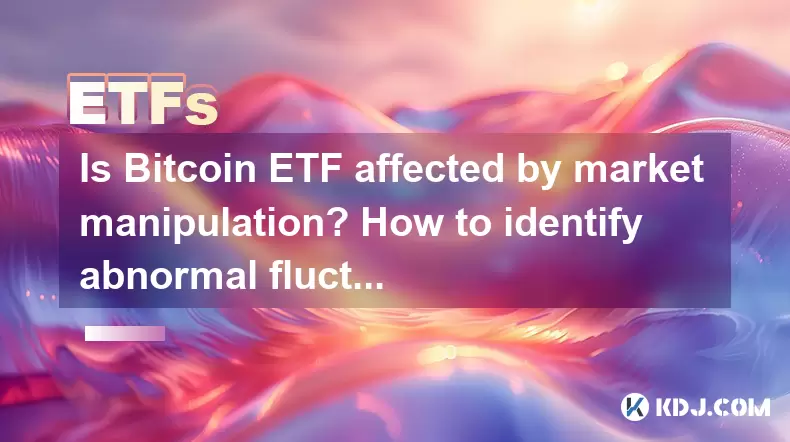
Is Bitcoin ETF affected by market manipulation? How to identify abnormal fluctuations?
Jun 14,2025 at 01:50am
Understanding the Concept of Bitcoin ETFA Bitcoin Exchange-Traded Fund (ETF) is a financial product that tracks the price of Bitcoin and trades on traditional stock exchanges. It allows investors to gain exposure to Bitcoin without directly owning the cryptocurrency. This structure simplifies access for institutional and retail investors, offering liqui...
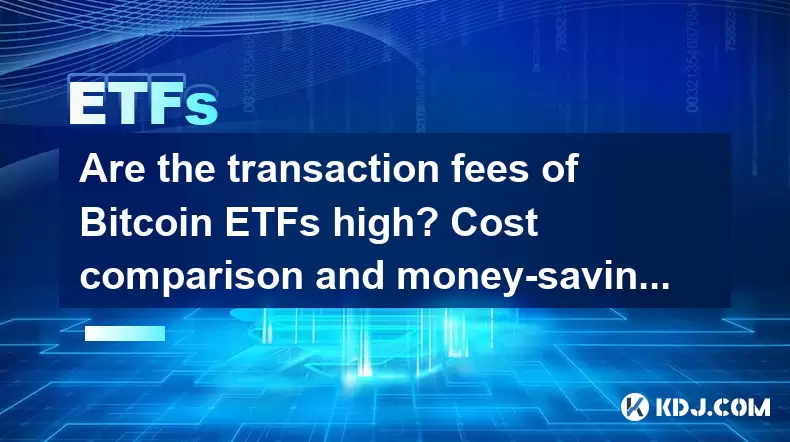
Are the transaction fees of Bitcoin ETFs high? Cost comparison and money-saving tips
Jun 15,2025 at 02:50am
Understanding Bitcoin ETFs and Their Transaction FeesBitcoin Exchange-Traded Funds (ETFs) have gained significant traction in recent years as a way for investors to gain exposure to Bitcoin (BTC) without the complexities of owning and securing the actual cryptocurrency. One of the key considerations for potential investors is the cost involved, particul...
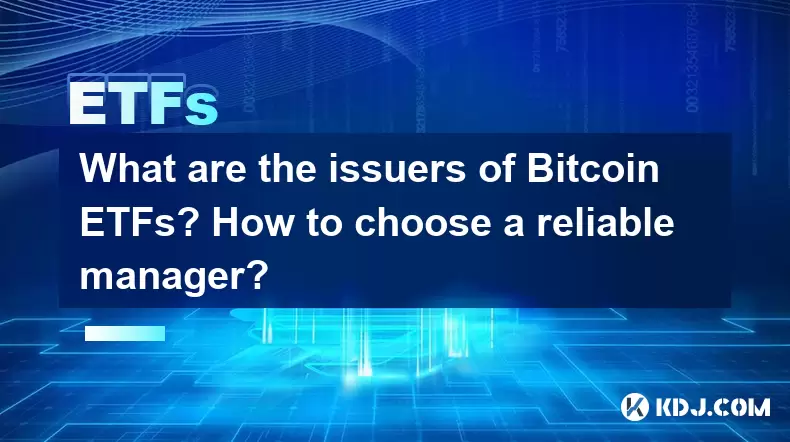
What are the issuers of Bitcoin ETFs? How to choose a reliable manager?
Jun 10,2025 at 10:22pm
Understanding Bitcoin ETFs and Their SignificanceBitcoin Exchange-Traded Funds (ETFs) are investment vehicles that track the price of Bitcoin without requiring investors to directly own or manage the cryptocurrency. These funds are traded on traditional stock exchanges, making them accessible to a broader range of investors who may not be familiar with ...
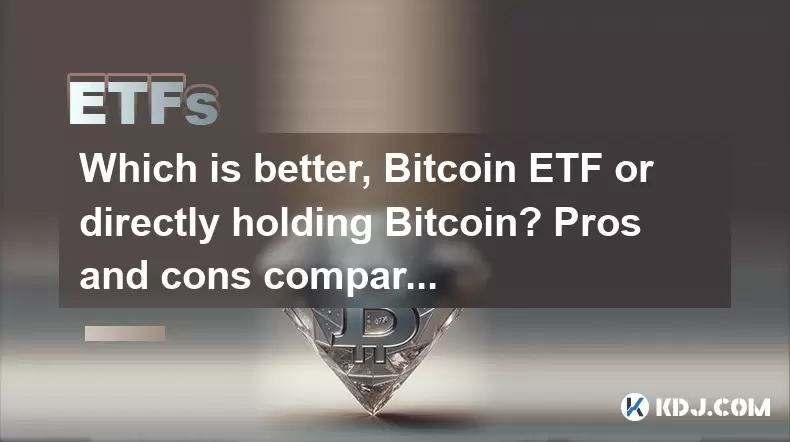
Which is better, Bitcoin ETF or directly holding Bitcoin? Pros and cons comparison analysis
Jun 12,2025 at 07:42am
What is a Bitcoin ETF?A Bitcoin Exchange-Traded Fund (ETF) is an investment vehicle that tracks the price of Bitcoin without requiring investors to own the actual cryptocurrency. These funds are traded on traditional stock exchanges and aim to mirror Bitcoin's performance by holding futures contracts, spot assets, or other derivatives. For many retail i...

What is the difference between Bitcoin ETFs and Bitcoin futures ETFs? Which is more suitable for retail investors?
Jun 12,2025 at 09:57pm
Understanding Bitcoin ETFs and Their PurposeA Bitcoin ETF (Exchange-Traded Fund) is a financial product that allows investors to gain exposure to Bitcoin without directly purchasing or holding the cryptocurrency. These ETFs are traded on traditional stock exchanges, making them accessible to retail investors who may not be familiar with crypto wallets o...

Does Bitcoin ETF support fixed investment? Sharing of automated investment strategies
Jun 10,2025 at 06:01pm
What is a Bitcoin ETF?A Bitcoin ETF (Exchange-Traded Fund) is an investment vehicle that tracks the price of Bitcoin and is traded on traditional stock exchanges. Unlike directly purchasing Bitcoin, investing in a Bitcoin ETF allows investors to gain exposure to Bitcoin without dealing with wallets, private keys, or blockchain transactions. The ETF hold...

Is Bitcoin ETF affected by market manipulation? How to identify abnormal fluctuations?
Jun 14,2025 at 01:50am
Understanding the Concept of Bitcoin ETFA Bitcoin Exchange-Traded Fund (ETF) is a financial product that tracks the price of Bitcoin and trades on traditional stock exchanges. It allows investors to gain exposure to Bitcoin without directly owning the cryptocurrency. This structure simplifies access for institutional and retail investors, offering liqui...

Are the transaction fees of Bitcoin ETFs high? Cost comparison and money-saving tips
Jun 15,2025 at 02:50am
Understanding Bitcoin ETFs and Their Transaction FeesBitcoin Exchange-Traded Funds (ETFs) have gained significant traction in recent years as a way for investors to gain exposure to Bitcoin (BTC) without the complexities of owning and securing the actual cryptocurrency. One of the key considerations for potential investors is the cost involved, particul...

What are the issuers of Bitcoin ETFs? How to choose a reliable manager?
Jun 10,2025 at 10:22pm
Understanding Bitcoin ETFs and Their SignificanceBitcoin Exchange-Traded Funds (ETFs) are investment vehicles that track the price of Bitcoin without requiring investors to directly own or manage the cryptocurrency. These funds are traded on traditional stock exchanges, making them accessible to a broader range of investors who may not be familiar with ...

Which is better, Bitcoin ETF or directly holding Bitcoin? Pros and cons comparison analysis
Jun 12,2025 at 07:42am
What is a Bitcoin ETF?A Bitcoin Exchange-Traded Fund (ETF) is an investment vehicle that tracks the price of Bitcoin without requiring investors to own the actual cryptocurrency. These funds are traded on traditional stock exchanges and aim to mirror Bitcoin's performance by holding futures contracts, spot assets, or other derivatives. For many retail i...
See all articles
























